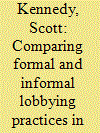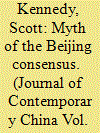|
|
|
Sort Order |
|
|
|
Items / Page
|
|
|
|
|
|
|
| Srl | Item |
| 1 |
ID:
093974


|
|
|
| 2 |
ID:
090113


|
|
|
|
|
| Publication |
2009.
|
| Summary/Abstract |
The marketization of China's economy and the attendant need for a supporting regulatory framework have resulted in extensive lobbying by Chinese and foreign industry. The central party-state has adopted an ambivalent posture toward this development. On the one hand, the government has encouraged the development of industry associations, public hearings, and comment-and-response periods for draft laws and regulations to routinize public policy consultations. On the other hand, the central party-state is deeply concerned about the political consequences of permitting greater social activism, and hence, it continues to constrain the maturation of these same formal institutions and processes. As a consequence, informal lobbying practices, such as direct lobbying and manipulation of the media, have become more prominent vehicles for industry involvement in the policy process.
|
|
|
|
|
|
|
|
|
|
|
|
|
|
|
|
| 3 |
ID:
095538


|
|
|
|
|
| Publication |
2010.
|
| Summary/Abstract |
The widely touted concept of the 'Beijing Consensus' (BC) suggests that China's economic success violates conventional theories of development and offers developing countries an alternative vision to the Washington Consensus (WC). Although ambitious, the original conception of the BC is not up to the task of being a worthwhile competitor to the alternative model from which its name was coined, not because of the WC's apparent worthiness, but rather because the BC is a misguided and inaccurate summary of China's actual reform experience. It not only gets the empirical facts wrong about China, it also disregards the similarities and differences China's experience shares with other countries, and it distorts China's place in international politics. In spite of these weaknesses, the BC is nevertheless a useful touchstone to consider the evolution of developmental paradigms, compare China's experience with that of others, identify the most distinctive features of China's experience, and evaluate its significance for the development prospects of other countries and for international relations.
|
|
|
|
|
|
|
|
|
|
|
|
|
|
|
|
| 4 |
ID:
109386


|
|
|
|
|
| Publication |
2011.
|
| Summary/Abstract |
A large number of communities, new developments, and regions aim to lower their carbon footprint and aspire to become "zero carbon" or "Carbon Neutral." Yet there are neither clear definitions for the scope of emissions that such a label would address on an urban scale, nor is there a process for qualifying the carbon reduction claims. This paper addresses the question of how to define a zero carbon, Low Carbon, or Carbon Neutral urban development by proposing hierarchical emissions categories with three levels: Internal Emissions based on the geographical boundary, external emissions directly caused by core municipal activities, and internal or external emissions due to non-core activities. Each level implies a different carbon management strategy (eliminating, balancing, and minimizing, respectively) needed to meet a Net Zero Carbon designation. The trade-offs, implications, and difficulties of implementing carbon debt accounting based upon these definitions are further analyzed.
|
|
|
|
|
|
|
|
|
|
|
|
|
|
|
|
| 5 |
ID:
094852


|
|
|
|
|
| Publication |
2010.
|
| Summary/Abstract |
We propose the introduction of an energy-based parallel currency as a means to ease the transition to energy-conscious living. Abundant fossil energy resources mask the internal and external energy costs for casual energy consumers. This situation is challenging communities that draw a significant fraction of their primary energy consumption from renewable energy sources. The Masdar Energy Credit (MEC) system is a way of translating the fundamental aspects behind energy generation and usage into a tangible reality for all users with built-in fungibility to incentivize collectively sustainable behavior. The energy credit currency (ergo) corresponds with a chosen unit of energy so that the total amount of ergos issued equals the energy supply of the community. Ergos are distributed to users (residents, commercial entities, employees, and visitors) on a subscription basis and can be surrendered in exchange for the energy content of a service. A spot market pricing mechanism is introduced to relate ergos to "fiat" currency using a continuously variable exchange rate to prevent depletion of the sustainable energy resource. The MEC system is intended to: (i) meet the sustainable energy balance targets of a community (ii) support peak shaving or load shifting goals, and (iii) raise energy awareness.
|
|
|
|
|
|
|
|
|
|
|
|
|
|
|
|
| 6 |
ID:
062103


|
|
|
|
|
|
|
|